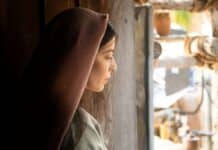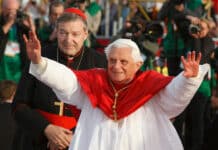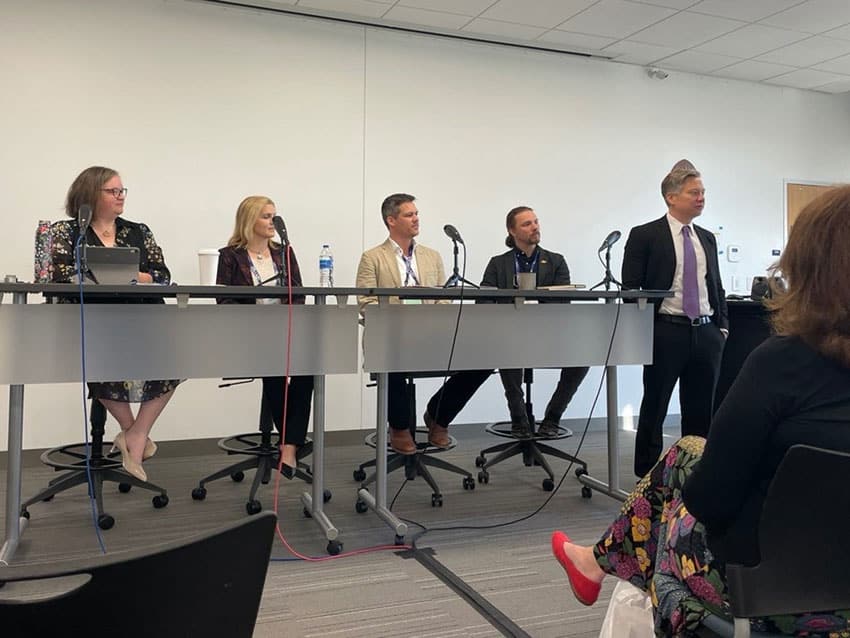
The fourth biennial Catholic Imagination Conference, bringing together Catholic poets, novelists and artists for two days of readings, panels, workshops and fellowship, was held from September 30-October 1 at the University of Dallas. The Catholic Weekly reached out to the organisers to ask about remote attendance but were told, refreshingly, that it was an in-person only event. The Weekly caught up with Joshua Hren, author of several works expressing the Catholic imagination, including the novel Infinite Regress (Angelico Press, 2022) and Contemplative Realism: A Theological-Aesthetical Manifesto (Benedict XVI Institute, 2022) to discuss the conference, and the state of Catholic letters more broadly. Joshua also runs the small press Wiseblood Books and is the co-founder, with poet James Matthew Wilson, of the MFA (Masters of Fine Arts) program in Creative Writing at the University of St Thomas in Houston.
CW: Can you give us a bit of background on The Catholic Imagination Conference?
The first one in 2015 was indebted to poet Dana Gioia and his essay “The Catholic Writer Today” which poses this question about the place of Catholics in contemporary national letters in the United States, and wonders why, while apparently such a large portion of the population is comprised of Catholics, yet from a birds’ eye view there are so few Catholic writers of national prominence. What he meant by that is not that there aren’t interesting things happening in the subculture of the subculture, which is very small, because few people read seriously these days and fewer of them are Catholics. He meant that there weren’t Catholic writers whose excellence was being recognised by the dominant culture. So that conference was founded as an attempt to do a phenomenological investigation into how true that is. If we pool everybody together from all the political spectrums within Catholicism, from all the different degrees of literary Catholicism from practicing, orthodox all the way to ex-Catholics whose imaginations are more in the style of James Joyce, what will happen? Will we able to disprove that paucity of presence?
What he meant by that is not that there aren’t interesting things happening in the subculture of the subculture, which is very small, because few people read seriously these days and fewer of them are Catholics
CW: How was this year’s Conference?
This year’s gathering, in part because it fell after the disincarnate years of Covid, had a distinctly different accent to previous ones. We were grateful just to be in the same place, and it was the most exhilarating. It was like a massive extended family reunion or picnic except instead of playing badminton or volleyball you were listening to impassioned and hilarious poetry and fiction readings. There was a more deliberate effort taken on organiser Jessica Hooten Wilson’s part to include things like workshops on how to write fiction, how to write poetry and to stage literary works like Arbery’s Heroes of the Fourth Turning. There was more delight taken in listening to great writers and up and coming writers share their work in their own voices. So someone after listening to Phil Klay and Ron Hansen do their reading said that he’ll never be able to read their works by himself again because now that he’s heard them do the stories in their own voices it’s so much more richly textured and layered and I think that that can’t be overestimated especially in a hyper-digital world where we feel we can get an approximation of an author because there’s so many podcasts they’ve done or things in that vein. Standing room only in a hot room where there’s an intensity. What was also remarkable from my vantage point was that that particular reading started with Phil Klay who read from his National Book Award winning Redeployment, he also read from Missionaries, a beautiful passage from “Prayer in the Furnace” steeped in a palpable thickly Catholic atmosphere, but in a contemporary idiom, and it ended with Ron Hansen and he was reading a hilarious story about a father who allows his children to get a dog but then he’s waiting for the dog to die and it’s sort of a shaggy dog story where he “accidentally” buries the dog before it dies—maybe twice—and it was so hilarious but for me the most exciting was in the middle was Sally Thomas, who is a Wiseblood author, and she read from her new novel Works of Mercy and it was clear to me that she was holding her own next to a National Book Award winning author and next to one of the most recognisably significant Catholic writers of the last thirty years and that was not happening in Chicago in 2019. That was not happening when this all started. So the efforts of these subsections of the subculture are actually gestating and editors and publishers are becoming more discriminating and the talent is being stimulated and cross-pollination is happening frequently enough that we’re just seeing the emergence of a new Catholic literary generation that has a kind of staying power. That is just so gratifying, there was so much gratitude to God in my heart to watch Sally Thomas up there.
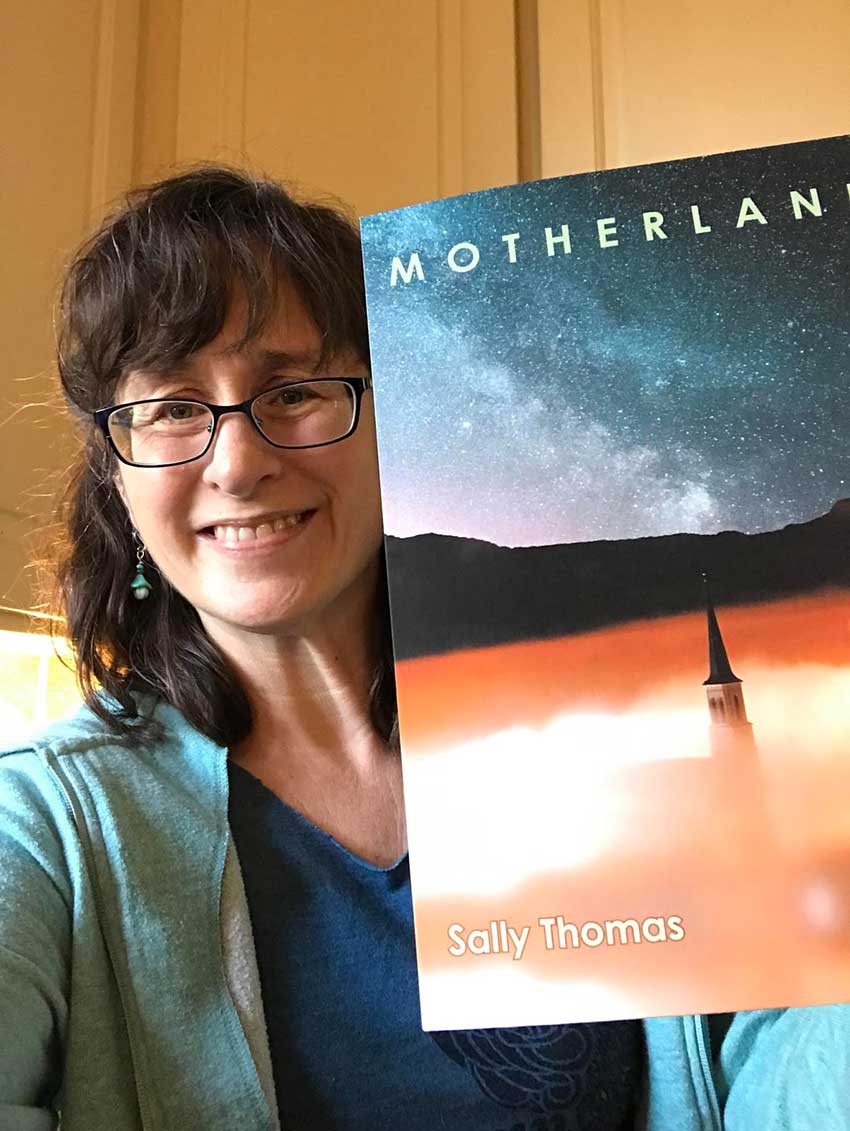
There was a Wiseblood Books panel with three of our novelists, Katy Carl, who read from As Earth Without Water, which has received endorsements from Christopher Beha the Editor of Harper’s, Trevor Merrill who wrote a campus satire in Minor Indignities and then Glenn Arbery, who is the President of Wyoming Catholic, who read from his second in a trilogy of novels called Boundaries of Eden, It’s sort of a Dantean trilogy so he read from the “Purgatory” section of his work. And unfortunately the power went out for that reading, or perhaps fortunately because everyone was leaning in, intently listening. And I was able to read from Infinite Regress as well, and lead a fiction workshop. The pre-conference sign up indicated I’d be teaching 17 or so, but it turned out we had more like 40 in the room, and delivering the lesson—which sought to help writers discern which rung of the ladder a given scene or even a given sentence seeks to represent, from the sensuous literal detail to the symbolic or mystical—was pure joy.
There were groups that had representation at this conference that didn’t at previous versions. One I would like to highlight is called Well-Read Mums and they have over 5,000 members in book clubs across America and the reason they were founded was because they were tired of going to so-called ‘book club’ to find that no one had engaged deeply with the reading. They are flourishing and growing and responding to that real need of mothers for imaginative and intellectual nourishment. Imagine if Catholics were to take Oprah’s book club and make it more substantial so instead of taking their cues from celebrity they would take their cues from these women who know the Catholic tradition and the Western tradition very well. The reason their presence is so important is that in the past there was this conclusion that many of us are writing and publishing the next generation of Catholic literary works but we just don’t have any readers, we don’t know how to find readers, there’s nothing we can do and there’s this sense that maybe at best you’ll read my work and I’ll read yours or “our audience will appear when we are dead and gone.” So the WRM have partially answered this question. There was another group called Catholic Literary Arts, who run Catholic oriented creative writing camps and after school programs for school-age students and they also run summer camps with intensive seminars and some of the students have won literary awards, so in a way there’s a pipeline from that to the MFA that James Matthew Wilson and I founded.
CW: How is the MFA going?
The program is completely full. We have over 50 students, and the thickness of that community is invigorating and inspiring. People are saying that their lives are being altered by the experience. Our students read on a panel to kick the conference off, and one story in particular by Dorian Speed was especially comical, a satire of the “creative class,” and people were just dying with laughter. There were 15 of our students at the conference. That crowd or that crew of people who are orthodox in their belief, devout in practise, a lot of them going to daily Mass, and also ascetical and uncompromising about artistic excellence—doing good time at the desk, daily—that crowd has just blown up even since 2019 and that creates a lot of hope for the future.
CW: Does this emerging Catholic scene have any cut through to the mainstream?
That’s a burning question. Flannery O’Connor famously said she didn’t care whether she has ten readers in fifty years and famously used the Maritain disposition of caring for the good of the work that is made and not reception, etc., but she was also clearly concerned with her audience. She expressly stated that she thought her audience was a world which lives as if God is dead. We have a range at the conference of writers who have broken into the wider literary world who are primarily not known as Catholic writers, most obviously Christopher Beha, who is still the editor of Harper’s. He is working on a non-fiction piece that covers his reversion to Catholicism but at least for now he’s not known for that. By his own reckoning he has found a way to be authentically Catholic where he’s not hanging up the Roman collar to put on the New York costume and to receive good reviews in “secular” publications but he made it clear that a lot of those reviews in the NYRB or venues like that were deaf to some of the most interesting or salient dimensions of his novels so he was very open about being grateful to the reviewers at the conference in Catholic and conservative periodicals, as he put it. Someone like him and Phil Klay don’t “need” to come to a conference like this to reach readers. But I get the sense that they find a family conviviality and appreciation of their work and a depth that may not exist elsewhere. And then there’s the vantage of the other side, Wiseblood authors, myself and other writers of faith who long to have our work taken seriously outside of these little ghettos or enclosed milieux. Mauriac in his memoir God and Mammon has this cathartic confession about not being ashamed to desire the most possible readers. There’s a problem with an inordinate desire for public reputation or success, yes, but there’s nothing innately wrong with hoping for readers. There is also a maturation in that regard for Catholic writers who used to be content with smaller audiences, and they—we—increasingly are being covered by publications outside the Catholic orbit—the Los Angeles Review of Books or The American Conservative, for instance.
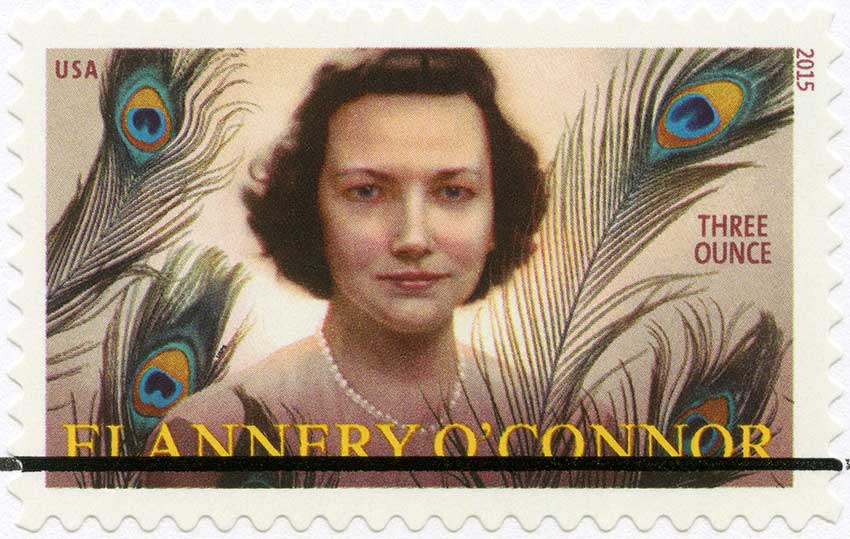
CW: Given that a Catholic could spend a lifetime reading Sacred Scripture, the Church Fathers and the lives of the saints, why should the average parishioner be interested in the contemporary literary culture?
This is a question I face all over the country when I give talks—at parishes it pops up frequently. Someone will express scandal at something they have read in Flannery O’Connor or whatever it might be and just a kind of a sense of confusion and a distaste even and years ago that used to irk me but then I realised that you don’t have to read literature to be saved (laughs). That being said, I don’t think that the Lives of the Saints and literature need to be considered watertight containers. Some of the best novels from Quixote and Austen and Balzac on portray conversion of a character from a kind of conceit or deception with regard to themselves to a sense of their own corruption and a recognition of those flaws that are followed by a reversal or at least in many of these novels we’re left not necessarily with a saint but at least someone who is on the threshold of radical shedding of self, a near transcendence of self. Thanks to the maturation of the novel under realism where there is a kind of intolerance of stereotypes and a readiness to engage all the nitty grittiness of life, the underbelly of actuality. Because of this there is exploration of struggles of existence that oftentimes in hagiography get short shrift or are not articulated in all of their agony and this helps us keep it real. If you just read lives of the saints there’s a huge section of human life that is not done justice to. That is the sort of pre-conversion, the natural level of existence. St John Henry Newman says that literature is the study of human nature first and foremost, it’s not the working out of grace on those characters, and I think he goes too far in that direction and Flannery has to come in and say yes literature is the study of man in rebellion but it’s also the record of man moving towards the beatific vision. There’s a lot of natural human wisdom even in novels that are not written by Catholics or Christians. It gets dicey in a lot of contemporary fiction because we are entering an age of total disconnect from the mores and modesty of the Christian imagination, so it can get so unhinged that there are certain literary waters so perilous no swimming instructor can save you from drowning in. The novel is the form that explores most exhaustively what it means to be a self. Unlike most of the rest of the world we live in that therapeutically celebrates the self, the novel (and I realize now that many of the ideas I am relaying are entirely indebted to the Catholic convert Rene Girard and his book Deceit, Desire, and the Novel) interrogates the self and that allows us to have insight about our own self-deceptions. Sins can lose their lure when we see characters falling for various temptations and getting trapped. We reel over King Lear’s awful actions, but we reel more over our near imitation of them. Strange paradox: each time I watch that play filled with warped relations between father and children, I become a better father to my own children. Also: if more rarely, fiction can achieve what Sister Mariella Gable called a psychology of goodness, “an art which moves the reader to accept the good as lovable”
If you just read lives of the saints there’s a huge section of human life that is not done justice to.
CW: In Contemplative Realism you make a strong case that the writer needs to be good in order to impart their work with goodness or even to be an effective writer at all. This runs counter to what we often hear today, separating the art from the artist, etc., where artists are even given a pass for being worse than an average member of the public. Is it really true that a good artist needs to be good?
In the manifesto I’m making a clarion call to writers of faith that for us there is no compromising, and there is no being content with anything short of sanctity, as Leon Bloy says the only tragedy in life is not to be saint. I believe that with every fibre of my being and I need to accentuate that in part because there is a romantic myth of the author, an influential lie, that tethers together those two strands: that on the one hand the writer needs to sin or at least be censoriously familiar with other people’s sins on a regular basis, to rub their nose in that depravity in order to accurately portray it and then on the other hand most writers and artists have just been bad people. Evelyn Waugh, great writer, not a very pleasant father, and so there is something there. I don’t mean to claim that all great novels have been written by saints, that is flatly not the case. Madame Bovary is a great novel, there is a storehouse of wisdom about human capacity for pettiness and our inclination for small-souledness when faced with challenges. There’s a lot to be learned from works written by authors whose lives were debauched. But a writer who is in a state of mortal sin can preserve for himself and for the reader the lure of certain sins, without setting out to do so, just setting out life as he understands it. I think one of the most fascinating cases is someone like Proust where in parts of his novel it is precisely because he is honest about his own failing that he’s not romanticising those sins but revealing them—provoking a turning away from them. You have to have a frank and honest appraisal of your own weaknesses and write in response to those weaknesses in a way that doesn’t romanticise them. As Rene Girard puts it: We all are tempted in our first drafts to uphold the characters as exemplary those that are most like ourselves. The work of a writer should really be a work of self-abnegation and self-purification just as you are asking your readers to come into that same project. There’s a lot of both-ands here and we don’t need to draw hard and fast lines where we don’t need to draw them, but then there are writers who possessed great sanctity, like Bernanos, who have a depth of vision, not just into human psychology, but into the depths of the human soul and that depth of vision is not possible without wedding yourself to the rhythms of the liturgy and the sacraments of the Church and steeping yourself in that storehouse of riches which hands you hard-won wisdom. When it comes to seeing the usually left unseen, that’s where to be a complete novelist you have to a mystic.
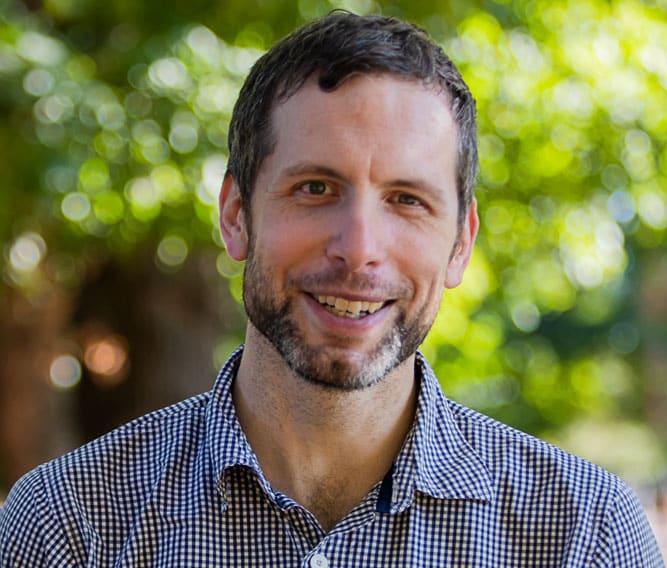
CW: How do you respond to one of the questions I had when reading Contemplative Realism, which is that narrative fiction itself, as opposed to chronicle, myth, epic, seems to arise hand in glove with the Reformation, the “Enlightenment” and modernism as these societies explain themselves to themselves and as the destiny of the individual comes to the fore. I can think of some exceptions but broadly speaking I think this is true in the European context. Can there be a truly Catholic novel then?
That earlier remark I was making about the novel kind of being obsessed with self is one of the weakness or potential weakness of the reductivism that you are describing, but I think there are contemplative realist novels that are not so anthropomorphic, that take the cosmos as their canvas, that are attentive in a painterly way to the beauties and the movements that exist outside of the human and that’s not a disparagement of the human, but getting outside of the Cartesian trap, but in general yes it’s is true that the novel did grow out of both a confluence of secularism and Protestantism—as Joseph Bottum argues: the novel is wrapped in Protestant clothing. I have an essay on this in my book How to Read and Write (Like a Catholic). Bottum says that the novel is a Protestant art, the individual soul’s journey is the greatest metaphysical drama in the universe, but when the individual soul’s journey is unhinged from salvation we can find ourselves in these finely tuned hyper-conscious novels of Virginia Woolf and others, stuck in this kind of relentless search inside the psyche and God is sort of a non-entity. But I think he’s wrong to say that when a Catholic-aiming novel fails it is because it is at war with its own form, necessarily. The novel is one of the most expansive art forms that exists and can contain all kinds of warring inclinations and proclivities without falling apart, so I think that the infusion of a Catholic vision into the novel is one more transformation. In part that would mean moving away from a focus on one character’s fate or conversion or salvation that is not explored at the expense of other characters who are portrayed as being in communion with him in this attempt to move towards his telos. In Brothers Karamazov you have a synthesis of hagiography and the modern novel, he basically takes everything that exists and puts it in the same space. The unity of the novel is sometimes strained when we’re moving across such different modes. When you start doing these things the book’s not going to have the smooth unity of that novel-master Henry James, so in that way I think Bottum has a point. The novel inclines towards raising questions and resisting answers. But Mikhail Bakhtin does say that in Dostoevsky’s novels Christ is the resolution of all ideological quests. He’s there in the background, not in the foreground as with someone like Giotto, but he’s there in the background for those who have eyes to see. But you do have to adhere to the rules of the form. There’s a reason why in Infinite Regress there are several drunken argumentative scenes that end in irresolution. I have answers to those questions but I don’t feel I’m going against my conscience in not having the characters answer them and in that sense I’m adhering to the form of the novel.
The novel is one of the most expansive art forms that exists and can contain all kinds of warring inclinations and proclivities without falling apart
CW: You are married with four children. How does family life impact your creativity and writing life?
Certainly when the muse is visiting and you’re seventy thousand words into a project and you’re just rolling downstream, the call of changing diapers is not easy to heed. I would say that that temptation has been more or less excised precisely because I was once a workaholic and I have a taste of the vapidity that comes with putting my work, whether that be academic or creative, ahead of the love that I owe to my family. There is a delight and joy in making a work of fiction that is distinct from the delight and joy of, for example, holding my six year old’s hand as we walk in circles praying the rosary, or throwing a knife at the tree in the backyard with my son. (He’s all boy, a Christian barbarian basically.) There’s just been a dramatic reorientation. I have a lot of responsibilities, I run a small press, I co-founded an MFA program I owe a debt of reviewing other people’s work and participating in public conversations, but first of all I try to get to daily Mass and pray rosary Compline in the evening with my family and just spend good time with them, reading and listening. Most days and most years fiction is last on that list so that means I simply don’t have as much time to write and I’m going to take longer to finish what I want to finish. I would also say that the joy of helping others bring their work to fruition as an editor for Wiseblood and also the MFA has the unintentional byproduct of keeping my own fictional chops sharp.
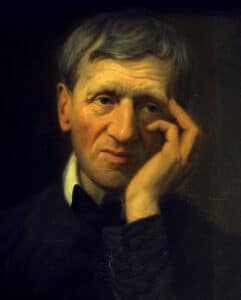
CW: What’s next for you?
I’m ankle-deep in the next project, ankle-deep not knee-deep. If Infinite Regress pursued the prodigal son who is trying to return home and followed that arc of return to the threshold the next book begins thematically after that and probes the tensions of a young woman, who as a single mother needs to move back in with her parents. She has a tumultuous relationship with an African-American man who is an activist-psychologist in South Chicago and she became pregnant with his child at the very moment when he’s being tapped to have a national microphone, with strings attached, to speak on behalf of his causes. Her father was previously very quiet about his political beliefs but now he is holding conspiracy meetings in his basement with basically an ad hoc militia and at the same time her lover is in DC leading this movement and she keeps trying to “escape” her family for a more independent life but she keeps coming back. She is startled by her father’s political commitments but he is extraordinarily sacrificial with the baby so she cannot write him off. It’s plausible that one of his more unhinged militia friends gets wind of her lover’s activities and seeks to shoot him in DC. That sounds very political, but the novel treats all this from the three-dimensional depth of relationships rather than as a documentary or a tract.
CW: What’s next for Wiseblood?
Flourishing more than ever. We just brought out a book by George Bernanos called Christianity and the Writer’s Task which has garnered a great deal of interest. We are publishing a long fantasy story in verse by an author called Marly Youmans, who has published with Farrar, Straus and Giroux, so we’re finding that the authors we are drawing in the last few years are of that calibre. We’re publishing a collection of Heimito von Doderer’s writings which’ll have a long—never-before published in English—introductory essay by Martin Mosebach. He’s a fascinating figure in that he wins a lot of secular literary awards in Europe but he’s known in America for his book The Heresy of Formlessness which is a defence of traditional Catholicism.
CW: What’s the best way for Australian readers to buy Wiseblood books?
I reluctantly say Amazon, because of shipping costs, you’d end up paying $45 for a title otherwise.
RELATED




